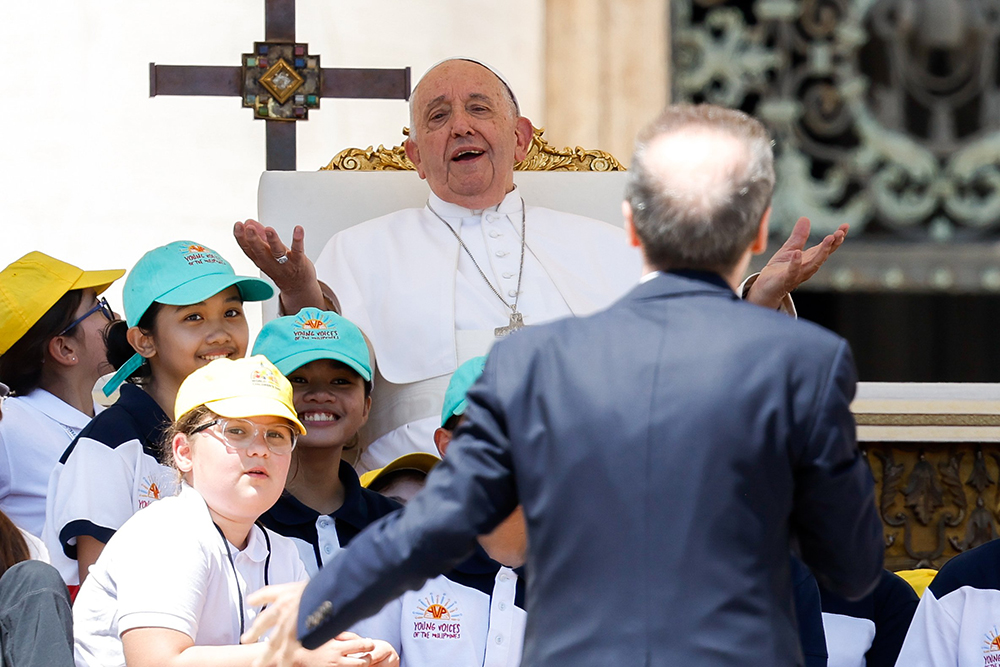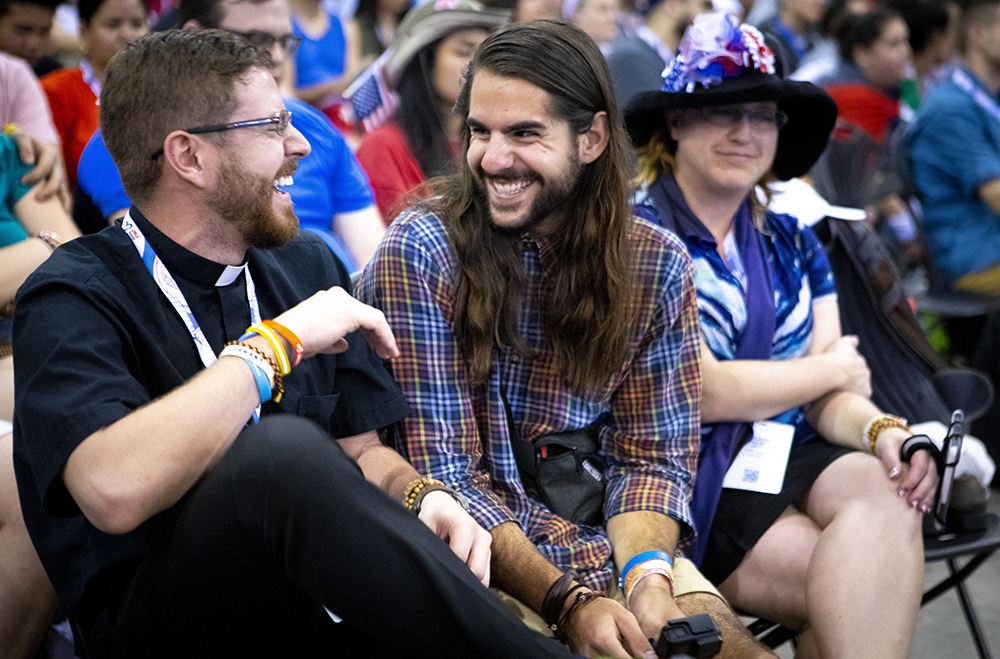
Pope Francis shares a laugh with Italian actor, Roberto Benigni, as Benigni gives the closing talk in St. Peter's Square at the Vatican May 26, 2024, wrapping up the first World Children's Day held May 25-26. (CNS/Lola Gomez)
Thirteen years ago, I arrived at Old Mission Santa Barbara where I would stay for a month praying, reflecting, sharing and dialoging with the other friars who, like me at the time, were preparing to profess our solemn vows later that summer. Over the course of a weekend, about half a dozen friars from around the country arrived at the retreat center. We began getting to know each other over meals and sharing stories, recognizing that what we shared in common was greater than whatever our differences may have been in terms of age, ethnic background, place of origin or respective home province (the Franciscans have restructured into one US province since then).
The last friar to arrive experienced some terrible travel delays and showed up late on the first full day together. He settled in fairly quickly but after dinner, when we as a group began a nightly custom of sitting together and talking or playing board games, this friar looked right at me and said: "You are not what I expected!"
I was a little taken aback and confused. He went on to explain that he had read several of the academic articles on medieval Franciscan theology I had written with appreciation, and envisioned the author being someone whose demeanor was more staid, maybe even somber or uptight, or some stereotype of a "serious person."
What he encountered was nothing like that at all. I often describe myself as a goofball, as someone who likes to laugh and make others laugh, who tells jokes and delights in bad puns. I enjoy comedy in a variety of forms, especially the more absurd kind. And this particular friar liked that about me, but it took him a moment to adjust what he had assumed about me in the abstract to align more with the lighthearted and funny person he now knew.
Advertisement
To be clear, I am in many ways a serious person. I take my work seriously, my faith seriously, issues of justice and peace seriously, but I try not to take myself too seriously.
All these years later, that encounter has stayed with me for a couple of reasons. For one, it offered a little insight into how quick we can be to presume we know someone based on the limited information we have from afar. We can be so quick at times to assume we know what a person is like just because we read their work or follow their social media or see them on television without ever meeting them in real life. It is tempting to want to assess, categorize and judge people without taking the effort to get to know them.
The other reason this exchange stayed with me was that it illustrates something about how some people think about the relationship between humor and spirituality. Comedy and laughter are, from this vantage point, inherently unserious and maybe even diametrically opposed to the practice of one's faith.
I think this perspective is wrong and often leads well-meaning people of faith to look down at things like comedic movies and television shows, stand-up comedy performances and perhaps even the telling of jokes.
There is something inherently spiritual and relational in the act of laughing. Laughing, maybe second only to eating, requires a distinct kind of vulnerability. One must let their guard down, feel comfortable enough in the presence of others — including strangers in a movie theater, stand-up comedy club or in the office break room — to allow oneself to be swept up into a shared moment of levity, which results in an instinctive physical, emotional, mental and — I would argue — spiritual response.
There is something inherently spiritual and relational in the act of laughing.
Perhaps it will not surprise regular readers of my column that I am inclined to invoke the great 20th century Jesuit theologian Fr. Karl Rahner, who wrote a short essay on laughter. He, like me after reflecting on that encounter with my brother friar, considered whether or not laughter and humor were opposed to authentic spirituality. He was thinking about what he called "real laughter, resounding laughter, the kind that makes a person double over and slap his thighs, the kind that brings tears to the eyes; the laughter that accompanies spicy jokes, the laughter that reflects the fact that a human being is no doubt somewhat childlike and childish."
With this uproarious sense of laughter in mind, he wrote:
The question is only this: whether or not the spiritual person must rightly call this laughter into question, whether or not he has to attack it as incompatible with the dignity of a spiritual person. No! Not at all! Let us explain and justify this laughter. When we do so, laughter shall smilingly tell us very serious things.
Rahner goes on to share that laughter is, first and foremost, an affirmation of our humanity. He notes that scripture proclaims that "there is a time to weep and a time to laugh" (Ecclesiastes 3:4) and that each of these actions is a legitimate expression of our full humanity and a form of praise of God because "it lets a human being be human."
He also says that laughter is a sign of love, because to laugh requires a form of sympathy. We must relate to those telling the jokes, sharing the story, acting in a comedic or entertaining way — and our response through laughter is an expression of solidarity and love.

A young adult shares a laugh with a priest in Panama City Jan. 23, 2019, at FIAT, the largest English-language World Youth Day event. Musical performances and testimonials were mixed with frank discussion about the clergy sexual abuse scandal. (CNS/Chaz Muth)
God laughs, too, Rahner asserts. God "laughs the laughter of the carefree, the confident, the unthreatened." This makes sense, of course, because God delights in the world and has given us a share in that divine joy that we can see reflected in the truly humorous and joyful experiences of laughter. Rahner says that laughter is also spiritual in this sense, because our laughter is a "gentle echo of God's laughter."
Laughter is a gift from God and a reminder that we are meant to be witnesses of God's joy in the world, not merely echo chambers of misery, division and gloom. This is something we need not only in broader society, but also in our church. Seriousness and faithfulness do not preclude humor and laughter. Pope Francis has modeled this so often in his public addresses and spontaneous interactions, especially with children (who definitely do not take themselves too seriously) and with other joyful people.
There are also abundant illustrations throughout scripture and Christian history of how humor and laughter have been integral parts of our spiritual tradition. A great introduction to some of these themes are presented in Jesuit Fr. James Martin's 2011 book, Between Heaven and Mirth: Why Joy, Humor, and Laughter are at the Heart of the Spiritual Life. What Rahner lays out as a foundational theology of laughter, his Jesuit brother Martin develops in an accessible and, of course, humorous way.
As we continue to face many difficulties, divisions and challenges in our world and within our faith community today, I believe it's a good idea to take some time to laugh, especially with other people.
Seriousness and faithfulness do not preclude humor and laughter.
Maybe it's over the summer barbeque or during a family reunion while telling funny stories about loved ones.
Maybe it's having a drink with friends and colleagues after a workday and recounting a silly event at a meeting or in the office.
Maybe it's going to the local comedy club to hear people tell jokes and stories to total strangers with whom you also embrace a shared vulnerability in letting yourself laugh with delight.
Maybe it's reading a funny book or watching a comedy or some other form of entertainment that allows you to let down your guard and laugh with the fullness of your humanity.
Whatever you do, remember that laughter is a deeply spiritual act and is also a form of praising God, which is something we should do as often as we are able.








